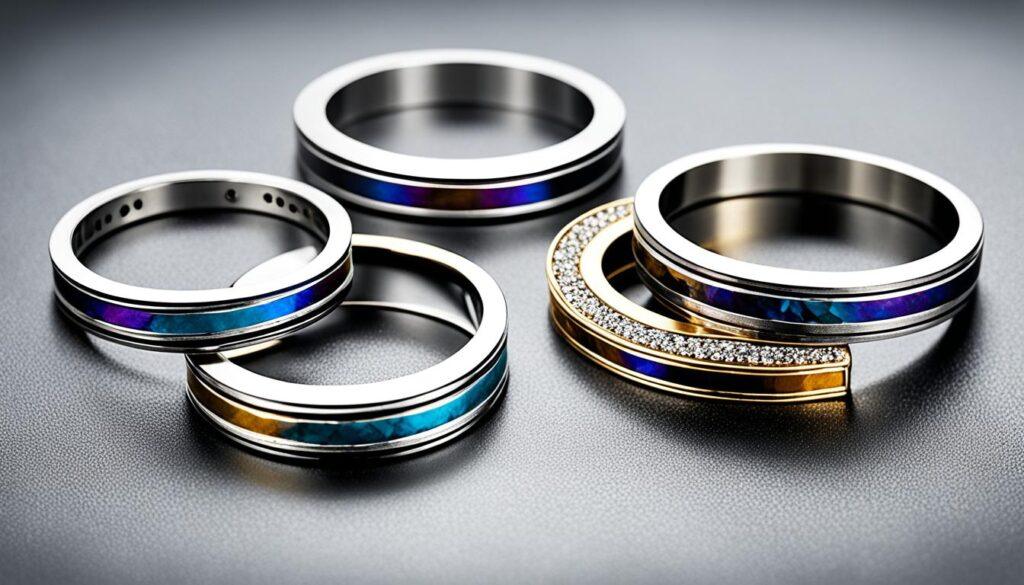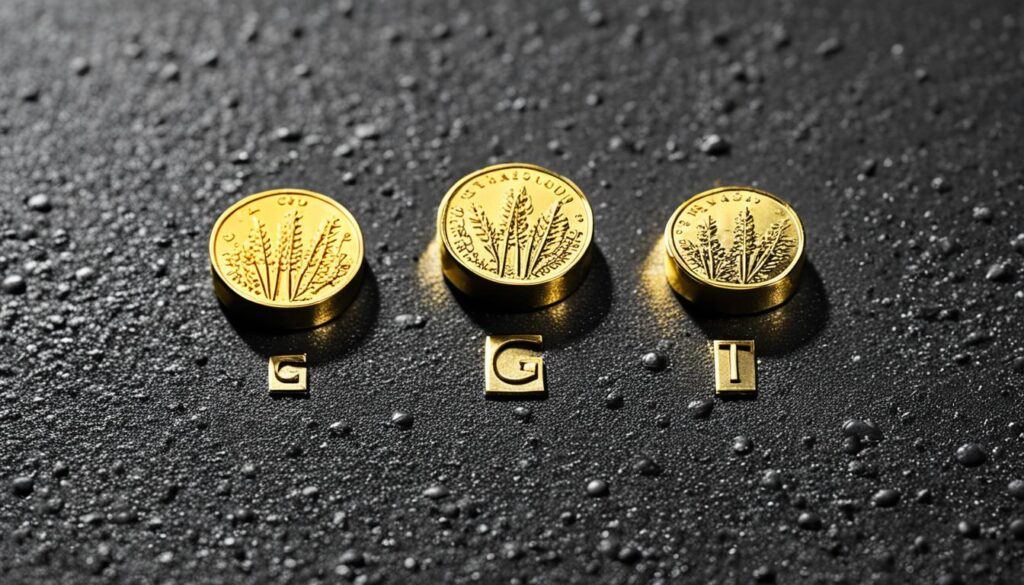Did you know that gold is the traditional choice for jewelry, including wedding rings, earrings, and necklaces? It’s a symbol of luxury and timeless beauty. But when it comes to hardness, is titanium softer than gold? Let’s dive into a fascinating comparison of these two metals and uncover their unique properties.
Key Takeaways:
- Gold is a popular choice for jewelry and comes in different carats and colors.
- Titanium is the hardest natural metal in the world and is three times stronger than steel.
- Gold and titanium have different properties, but both are suitable for jewelry.
- Titanium offers advantages such as scratch-resistance, flexibility, and biocompatibility.
- Gold can cause allergies in some individuals, while titanium is hypoallergenic.
Properties of Gold
Gold is a precious metal known for its beauty and value. Let’s explore the properties of gold, including its carat, colors, hardness, and durability.
Gold Carat
Gold comes in different carats, with 9kt, 14kt, and 18kt being the most common. The carat represents the gold content in the metal. Higher carats indicate a higher gold content, making them more valuable and expensive.
Gold Colors
Gold can vary in color, with yellow gold being the most popular choice for jewelry. Other popular options include white gold, which is created by mixing gold with white metals like silver or palladium, and rose gold, which is created by adding copper to the gold alloy. The color of gold is determined by the metals used in the alloy mix.
Gold Hardness and Durability
Gold is relatively hard and durable. It has a Vickers hardness of 120 for 9kt gold and 125 for 18kt gold. Both 9kt and 18kt gold are suitable for all types of fine jewelry and can withstand everyday wear. However, 9kt gold is more difficult to bend and may be less likely to deform than 18kt gold.
Here’s a table summarizing the properties of gold:
| Property | 9kt Gold | 18kt Gold |
|---|---|---|
| Gold Content | 37.5% | 75% |
| Color Options | Yellow, White, Rose | Yellow, White, Rose |
| Hardness (Vickers) | 120 | 125 |
| Durability | High | High |
Gold’s properties make it an excellent choice for fine jewelry. Its durability ensures that it can withstand the test of time, while its timeless beauty and versatility allow for a variety of design options.

Gold colors
Gold colors refer to the different shades of gold, which are determined by the metals mixed with gold to create an alloy. The most common gold colors include:
- Yellow Gold: This is the natural color of pure gold, giving it a warm and vibrant appearance.
- White Gold: White gold is created by mixing gold with white metals such as palladium, nickel, or zinc. It has a silvery-white color and is often plated with rhodium for a shiny finish.
- Rose Gold: Rose gold gets its distinctive pinkish hue from the addition of copper in the alloy. It has a romantic and vintage appeal.
Overall, gold’s properties, including its carat, colors, hardness, and durability, make it a highly desirable metal for jewelry creation. Whether you prefer the classic yellow gold or the contemporary appeal of white or rose gold, gold’s enduring beauty is sure to stand the test of time.
Properties of Titanium
Titanium is a remarkable natural element with a stunning silver-greyish-white color. Its unique properties make it a standout choice for various applications, including jewelry.
When it comes to hardness, titanium is unparalleled. It is known as the hardest natural metal in the world, surpassing even steel in strength. This exceptional property ensures that titanium jewelry remains resistant to scratches and maintains its pristine appearance over time.
Another advantage of titanium is its remarkable durability. Thanks to its robust nature, titanium jewelry can withstand daily wear and tear without succumbing to damage. Whether it’s a ring, necklace, or bracelet, you can trust titanium to maintain its beauty and integrity, even with regular use.
Despite its exceptional hardness and durability, titanium remains lightweight. This makes titanium jewelry incredibly comfortable to wear, allowing you to enjoy its elegance without any discomfort or strain on your body.
Furthermore, titanium is renowned for its hypoallergenic properties. It is completely safe to wear for people with sensitive skin, as it does not cause any allergic reactions or irritations. You can confidently showcase your style with titanium jewelry, knowing that it won’t compromise your comfort or well-being.
The flexibility of titanium adds to its allure in the world of jewelry. Jewelry designers have the freedom to explore innovative stone setting designs, creating unique and captivating pieces that are sure to turn heads. This flexibility enables the creation of intricate and eye-catching designs that truly stand out.
What sets titanium apart from other metals is its exceptional biocompatibility. This means that titanium is readily accepted by the body and can be used in medical implants. Its biocompatibility further cements titanium as a safe and reliable choice for jewelry, ensuring that it is well-tolerated by anyone who wears it.

With its impressive combination of hardness, durability, lightweight nature, hypoallergenic properties, flexibility, and biocompatibility, titanium has solidified its place as a sought-after material for creating stunning and enduring jewelry pieces. Whether you’re looking for a timeless ring, an elegant necklace, or a stylish bracelet, titanium offers a winning combination of beauty and reliability.
Comparing Gold and Titanium
Gold and titanium are two popular metals used in the creation of jewelry. While both offer their own unique properties and characteristics, they also have distinct differences that make them suitable for different preferences and styles.
Differences:
When it comes to durability, titanium shines as the hardest natural metal, making it highly resistant to scratches and everyday wear. Gold, on the other hand, is relatively hard and durable but may wear down over time, especially in higher carats. Additionally, titanium is known for its lightweight nature, providing comfortable wear for long periods.
Biocompatibility:
One of the standout features of titanium is its excellent biocompatibility. It is hypoallergenic, making it suitable for individuals with sensitive skin. This quality also allows titanium to be used in medical implants. Gold, although generally well-tolerated, can cause allergies in individuals, especially if it contains nickel.
Suitability for Jewelry:
Both gold and titanium are widely used in the creation of jewelry, offering a range of options for different styles and preferences. Gold comes in different carats and colors, allowing for versatile designs. Titanium, on the other hand, offers a variety of colors through anodization, providing even more options for unique and vibrant designs. It is important to note that while gold jewelry can be resized, titanium jewelry often requires specialized equipment and expertise for alterations.
To summarize, the choice between gold and titanium ultimately depends on personal preferences and desired characteristics. Gold offers versatility in carats and colors, while titanium stands out with its durability, biocompatibility, and lightweight nature. Consider your style preferences, durability requirements, and any potential allergies when making your decision.
| Characteristics | Gold | Titanium |
|---|---|---|
| Durability | Relatively hard and durable, but may wear down over time | Highly durable and scratch-resistant |
| Weight | Moderate weight | Lightweight |
| Biocompatibility | May cause allergies, especially if containing nickel | Hypoallergenic and biocompatible |
| Suitability for Jewelry | Versatile options in carats and colors | Can be anodized to provide a variety of colors |
Safety and Allergies
When it comes to jewelry, safety and allergies are important factors to consider. Gold and titanium, two popular metals used in the creation of jewelry, have different effects on individuals with sensitivities or allergies.
Gold Allergies: Gold can cause allergies in some individuals, particularly if it contains nickel, which is a common allergen. Nickel allergies are relatively common, and symptoms can include redness, itching, rash, and irritation on the skin. People with nickel allergies should ensure that the gold jewelry they wear is nickel-free to avoid any adverse reactions.
Titanium Allergies: Titanium, on the other hand, is hypoallergenic and biocompatible, making it safe for anyone to wear without causing skin reactions. Titanium does not contain nickel, which significantly reduces the risk of allergies. This is why titanium is often used in medical implants, where biocompatibility is crucial.
Both gold and titanium have their advantages and disadvantages when it comes to allergies and safety. While gold can cause allergies in some individuals, it is important to note that not all gold contains nickel. Nickel-free gold, which is specifically designed for people with sensitivities, is widely available in the market.
It is beneficial to consider individual sensitivities and preferences when choosing jewelry. Those with known nickel allergies may find titanium to be a safer and more comfortable option. However, for individuals without nickel allergies, gold jewelry, especially nickel-free gold, remains a popular and classic choice.
| Gold | Titanium |
|---|---|
| Can cause allergies in individuals with nickel sensitivities | Hypoallergenic and safe for anyone to wear |
| Availability of nickel-free gold options | Does not contain nickel |
| Classic and timeless choice | Popular for its biocompatibility |
It is always recommended to consult with a dermatologist or allergist if you have concerns about metal allergies, as they can provide personalized advice based on your specific sensitivities and medical history.
Conclusion
In conclusion, the question of whether titanium is softer than gold depends on the specific characteristics and properties of each metal. Gold is available in different carats and colors, offering a wide range of options for jewelry. It is relatively hard and durable but may wear down over time. On the other hand, titanium is the hardest natural metal, highly durable, scratch-resistant, and lightweight. It is also hypoallergenic and biocompatible, making it a safe choice for those with sensitive skin.
When comparing gold and titanium, it’s important to consider personal preferences and the desired qualities in jewelry. Gold has a long-standing tradition and comes in various shades, while titanium offers unique attributes such as strength, flexibility, and resistance to scratches. Both metals have their advantages, and the choice ultimately boils down to individual taste and lifestyle.
Whether you prefer the timeless elegance of gold or the modern appeal of titanium, both metals can make beautiful and durable jewelry pieces. It’s always recommended to consult with a professional jeweler who can help guide you in selecting the right metal that matches your style and suits your needs.
FAQ
Is titanium softer than gold?
No, titanium is harder than gold. Titanium is the hardest natural metal in the world, whereas gold is relatively hard but not as hard as titanium.
What are the properties of gold?
Gold comes in different carats, representing the gold content in the metal. It is available in yellow gold, white gold, and rose gold. Gold is relatively hard and durable, suitable for all types of fine jewelry. The Vickers hardness of gold ranges from 120 for 9kt to 125 for 18kt.
What are the properties of titanium?
Titanium is the hardest natural metal and is three times stronger than steel. It is lightweight, hypoallergenic, and biocompatible. Titanium is highly durable and scratch-resistant, making it an excellent choice for jewelry. It is also flexible, allowing for innovative stone setting designs.
How do gold and titanium differ?
Gold and titanium have different properties. Gold comes in different carats and colors, while titanium can be anodized to create various colors. Gold is relatively hard and durable, but titanium is harder and more scratch-resistant. Titanium is also lightweight, flexible, and biocompatible.
Are gold and titanium safe for allergies?
Gold can cause allergies in some individuals, especially if it contains nickel. It is important to ensure that gold jewelry is nickel-free for those with sensitive skin. Titanium, on the other hand, is hypoallergenic and safe for anyone to wear without causing skin reactions.



